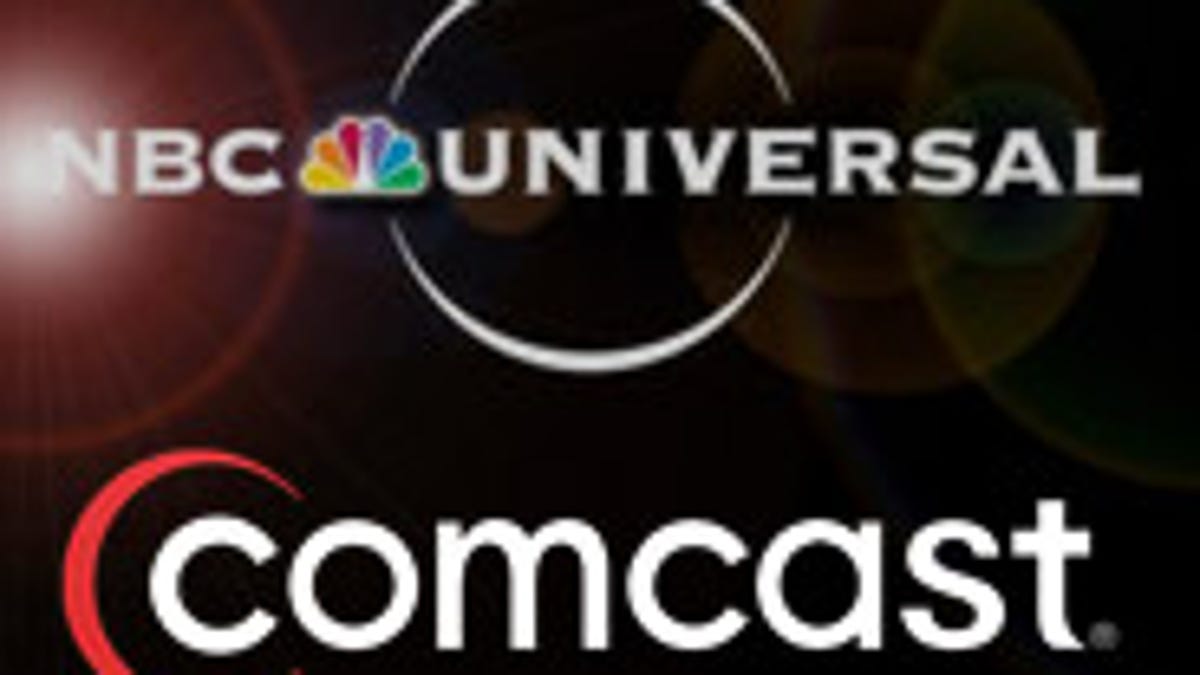Comcast poised to get NBC Universal
Comcast and NBC parent company General Electric are close to an agreement where Comcast will buy a majority stake in the entertainment division, according to CNBC.

Updated 5:10 p.m. PDT with information about the financial details of the deal.
Comcast is very close to sealing the deal to acquire NBC Universal, CNBC anchor and reporter David Faber reported Tuesday. The only thing left to do is sign the papers.
Faber said in a story posted on the CNBC Web site that the deal is expected to be formally announced on Thursday. But CNET sources close to the deal say the final details could take longer to tie up, and the final announcement could be pushed back until early next week.
Earlier Tuesday, The New York Times and The Wall Street Journal reported that General Electric, which owns 80 percent of NBC Universal, had reached a tentative agreement with French media company Vivendi, which owns 20 percent of NBC Universal. GE agreed to pay $5.8 billion to buy back the 20 percent stake, reports said.
The Vivendi stake was the only major obstacle standing in the way of an agreement between GE and Comcast. It's been reported that the companies have valued the deal at $30 billion.
While the value sounds high, in reality Comcast is getting a pretty good deal. The way the transaction is structured, Comcast would contribute its cable TV stations and $6 billion in cash to get 51 percent of NBC Universal. And GE would contribute all of the NBC Universal assets, including the movie studios, cable channels, theme parks, TV production and broadcast properties for a 49 percent stake in the company. The newly formed joint venture would then take on an additional $9 billion in debt.
These assets, the new debt, and the cash contributed by Comcast is how the companies arrived at the $30 billion valuation. This means that Comcast will only be contributing in cash about a fifth of the overall valuation of the company.
The deal will also include a provision that will allow GE to sell its remaining stake in NBC Universal down the road. At around the three year mark and the seven year mark, the NBC Universal joint venture will have the opportunity to use its own cash to buy out GE's remaining stake in the company. This transaction would give Comcast 100 percent control of the company. If the joint venture cannot come up with all of the cash to buy out GE, Comcast can contribute around $2 billion to buy the remaining stake. But the company has put a back-stop clause into the deal to ensure that the amount of cash that Comcast spends to acquire full control of NBC Universal is not over a pre-determined amount.
But even when the business deal is officially signed and sealed, the transaction is far from being completed. The acquisition will still have to pass muster with the U.S. Department of Justice, as well as the Federal Communications Commission. Government regulators are expected to closely scrutinize the deal in a process that could drag on for more than a year.
Faber's sources say they expect the deal will be approved by regulators. But Craig Moffett, an equities analyst with Bernstein Research, said in a research note in late October, when rumors of the deal were heating up, that regulators may find plenty of reasons to reject the acquisition.
The biggest problem for the deal could be the fact that GE and Comcast will try to close it during a midterm election year. Politicians taking sides on Net neutrality issues and the national broadband plan may find it easy to bash Comcast. And a marriage between the nation's largest cable and Internet service provider and one of the nation's three broadcast TV stations may ignite old fights over media ownership, a la carte billing, retransmission consent, and cable prices.
"Cable-bashing in an election year is a no-lose bipartisan proposition," Moffett writes in his note. "The headline risk is quite material. Approval of a deal, should one be reached, cannot be assured."
If the deal is allowed to be completed, it would make Comcast one of the nation's largest entertainment companies. Comcast wants NBC Universal mainly for its cable channels, such as Bravo and CNBC. Comcast already owns several channels of its own, including E! Entertainment, the MLB Network, G4, and the Golf Channel.
Good for consumers?
One of the synergies from the deal that could benefit consumers is that some movies may reach cable TV and on-demand services more quickly, since Comcast will control NBC Universal's movie catalog. Comcast may also be able to put content more quickly on cell phones.
Still, some experts are nervous that Comcast would wield too much power in the entertainment industry.
Regulators will likely look at whether Comcast could use NBC's programming to undermine rival TV services from phone companies, such as AT&T or Verizon Communications, or from cable operator Dish Network.
The deal may also have an effect on online video services, such as Hulu, which is owned by NBC, News Corp., and Walt Disney Company. That said, Comcast has been experimenting with its own online video service for some premium channels for Comcast customers. The company also already has a Web-based video aggregator called Fancast, which streams full TV shows and movies for all Web users.
Comcast tried and failed to buy Walt Disney Company back in 2004. And analyst Craig Moffett believes that a failed attempt to buy NBC Universal could be devastating to the company's stock price.
"Comcast has again clearly signaled its desire to be in the content business," he said in his research note in late October. "In the absence of a deal, investors would be left waiting for the next shoe to drop."

